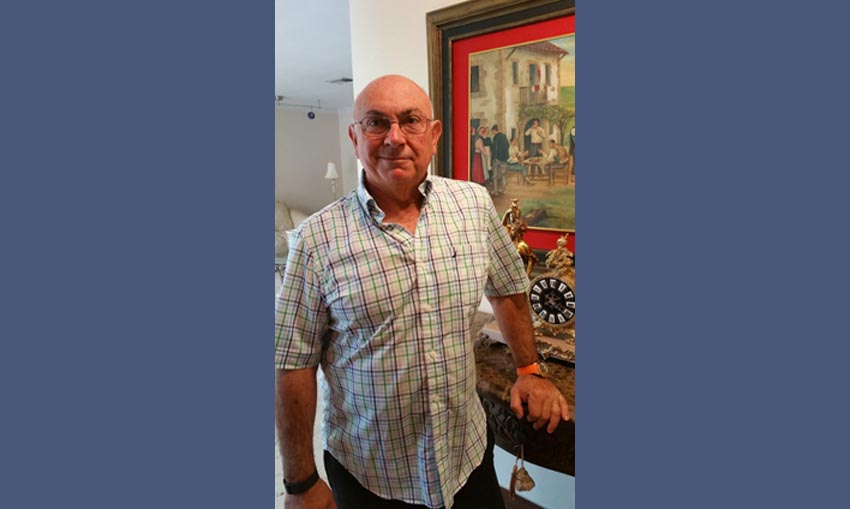Joseba Etxarri. Born in Gernika, although “more Busturiarra than anything else,” Boni Guenetxea is in reality; since he stepped as a palotari onto a Florida fronton for the first time in 1968, a Florida Basque. Pelota brought him to the United State, the country where he founded a family and where his children were raised. After the pelotari strike in 1988 and the beginning of the decline of the sport that was once iconic in this area of the country, he channeled his steps towards culinary services and catering, competing with his company Paella Party and his famous paella (that he makes for weddings, receptions and at the houses of his clients) with an American BBQ. It’s not going badly for him, and he also has other former pelotaris among his employees. At 62 years of age, Boni spends time and effort at the Basque club, being a Basque reference in Miami. Boni is a committed person with the values, and cultural heritage he received in his home country, and that he cultivates and shares in his American surroundings.
This Sunday you all celebrated Miami’s First Annual Basque Rural Sports Jaialdi…
-There were 140 adults and some 20 children and we enjoyed a beautiful day around herri kirolak. It was a success and I would like to thank the aizkolaris that came from the northeast of the country as well as from California for their participation, also to all the volunteers who helped out. We had aizkolaris, txingas, sokatira and a weightlifting demonstration. We also held a Mus tournament and a paella contest. We had a good day, although it was pretty chilly in the evening. We would have had more people, but when we chose the day we didn’t realize that it was Super Bowl Sunday, the event that catches more people in the US, and probably in the world watching TV.
That day you had to get up at four in the morning and go to bed at midnight, to go back and clean the next day…
-Volunteer work is inherent in Basque clubs. You do it because you believe things need to be done. Let me take advantage of this opportunity to thank our volunteers for their work, particularly to Conchi and Armando, Magu and Ernesto, my wife Sara and my son Daniel, to Miren and the seven employees at our company who got up early and contributed so that everything would turn out as we hoped; also to the Angulo family, who is always ready to host our events at their beautiful property near the lake…
The Euskal Etxea of Miami is linked to pelota. The current situation has nothing to do with what it was in the 70s or 80s.
-In Florida there had been 11 frontons and today Miami and Dania are all that are left, we can mention Fort Pierce and anecdotally, Ocala, because they do play a few games in order to keep their license. The world of the game and the betting ate Jai Alai. Today, people prefer betting on other things. Dania Jai-Alai just changed its name to Dania Beach Casino. The question is being debated in the legislature and if not this time, I think that it will happen, sooner or later, that the State will allow gaming companies to get rid of the frontons. I knew the gold years of Jai Alai in the US and it makes me really sad; pelota is something that I carry within.
Bonigüen was your pelotari name. What was that life like?
-They were precious years. Of course we were young. The frontons filled and people knew you. We didn’t earn as much as professional American athletes, but if you had a good eye, you could save, invest and prepare for your future. The life? It was night life. We got up at 10 or 11 in the morning, and we would go to the beach to do legs, we’d play games and leave the fronton at midnight to later go have a drink with the fans and get home at three or four in the morning, if you were well behaved.
Pelotaris in Tampa opened the first Euskal Etxea in Florida.
-An injured pelotari in Tampa came to Miami and talked about it. I had also always wanted to put something together so we talked, and I found a venue that we later modified, and that is how, among some of us, we formed Toki Ona in 1986, with room for pelotaris, families and children… Soon after another group formed Txoko Alai, more like a culinary txoko just for men. Later we united to form one club in Miami; with the decline of pelota the one in Tampa ended disappearing.
What keeps you going and working so hard?
-I don’t know, but that is the way it is. From here we are helping youth that come from the Basque Country and ask for advice, we have had Basque classes, we hold get-togethers and events like Aberri Eguna, San Inazio…It is something that you carry within and that you don’t want to lose, even though it is clear that the more support we have the better. We invite Basques who visit Florida, or who live here and don’t know us to get in touch. Our next event, Aberri Eguna, will be in March.






 Send to a friend
Send to a friend Add comment
Add comment








